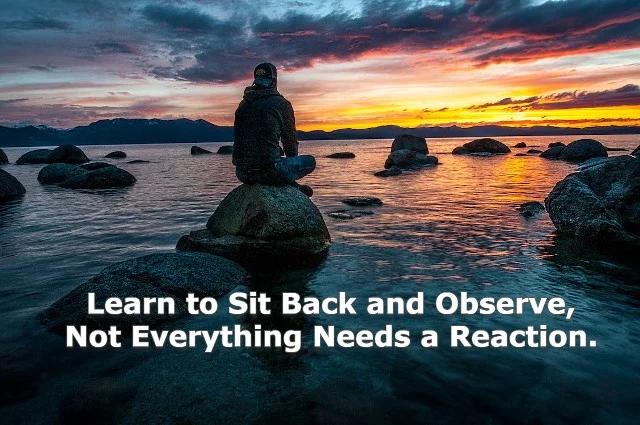In an era where instant reactions are often valued over thoughtful responses, the wisdom of Tymoff’s philosophy—“Learn To Sit Back And Observe. Not Everything Need – Tymoff” holds profound significance. This approach not only offers a respite from the fast-paced demands of modern life but also cultivates a deeper connection to the world around us. By learning to pause and process, we can make more informed decisions and respond to life’s challenges with greater clarity and effectiveness.
Table of Contents
Embracing the practice of observation over reaction is not about inaction; rather, it is about controlled action. It’s about understanding when to step forward and when to remain still. This philosophy encourages us to reflect on our immediate impulses and consider whether our involvement is truly necessary or beneficial. As we begin to integrate this mindset into our daily lives, we’ll discover the many advantages of choosing to observe first and act second.
The Power of Observation Over Reaction
Observing before reacting can transform our experiences and outcomes in life. By stepping back, we give ourselves the opportunity to view situations from a broader perspective, which often leads to wiser and more measured responses. For instance, in a heated discussion, taking a moment to listen and observe can prevent misunderstandings and foster better communication. The ability to detach and watch allows us to assess the emotional states and intentions of others more accurately, leading to more empathetic interactions.
The practical benefits of this approach are numerous. In professional settings, it can mean the difference between a hastily made poor decision and a strategically thought-out plan. In personal relationships, it helps us understand the underlying issues rather than just reacting to the symptoms. By applying the principle of “Learn to sit back and observe. Not everything needs your reaction”, we harness the power to enhance our decision-making process and improve our relationships.
How Observing Can Improve Emotional Intelligence
Observation is a key component of developing emotional intelligence. By consciously choosing to observe rather than react, we become more attuned to the nuances of social interactions and the emotions of those around us. This heightened awareness enables us to better manage our own emotions and respond more effectively to others. Emotional intelligence, strengthened through observation, equips us with the skills to handle interpersonal relationships judiciously and empathetically.
Moreover, this practice encourages us to recognize our own emotional triggers and understand the context of others’ behaviors. This understanding can lead to more resilient and adaptable behaviors, enhancing personal and professional relationships. Through regular practice, we can transform our ability to navigate the complexities of human emotions, leading to more fulfilling and less confrontational interactions.
Mindfulness and Observation
Mindfulness is intimately connected with the art of observation. It teaches us to be present in the moment without judgment. By practicing mindfulness, we learn to sit back and observe our thoughts, feelings, and surroundings without the compulsion to immediately react. This can be as simple as noticing the sensations of breathing or as complex as observing the dynamics in a room full of people.
Integrating mindfulness into daily routines can be achieved through various techniques such as meditation, focused breathing, or mindful walking. These practices help stabilize our thoughts and center our focus, making it easier to apply observational skills in everyday situations. The benefits of this practice are manifold, ranging from reduced stress and anxiety to improved cognitive functions and emotional resilience.
Strategies to Develop the Habit of Observation
Developing the habit of observation requires conscious effort and practice. Here are a few strategies to cultivate this valuable skill:
- Daily Mindfulness Practice: Dedicate time each day to practice mindfulness through meditation or other techniques.
- Reflective Journaling: Keep a journal to reflect on daily experiences and your reactions to them. This helps build self-awareness and promotes a habit of observation.
- Set Observation Goals: Regularly set small, achievable goals to observe certain behaviors or interactions, which can gradually enhance your observational skills.
Each of these strategies not only helps in developing observational skills but also enriches our understanding of ourselves and the world around us. By consistently practicing these techniques, we can more naturally incorporate observation into our daily lives.
The Impact of Non-Reaction in a Hyper-Connected World
In today’s digital age, where information and stimuli bombard us constantly, the ability to sit back and observe becomes even more crucial. Non-reaction allows us to filter the noise and focus on what truly matters. For example, not reacting immediately to every notification or message can help maintain focus and decrease stress levels.
Case studies show that companies encouraging a culture of reflection over immediate reaction tend to have higher employee satisfaction and better decision-making processes. These organizations understand the value of taking a step back, which often leads to more innovative solutions and strategic thinking.
Conclusion
Adopting the philosophy of “Learn To Sit Back And Observe. Not Everything Need – Tymoff” can significantly enhance our lives. This approach allows us to experience the world more fully, develop deeper relationships, and act with more wisdom and compassion. As we continue to practice observation, we foster a greater sense of peace and understanding in our interactions and decision-making processes.
By embracing the lessons from Tymoff and integrating them into our daily routines, we can transform our reactive impulses into opportunities for growth and enlightenment. Remember, not every situation requires our reaction, but every situation deserves our understanding.
Read More : A True Relationship is Two Imperfect People Refusi – Tymoff

